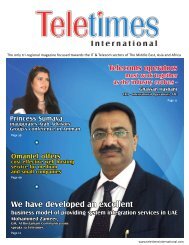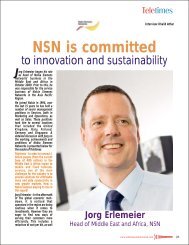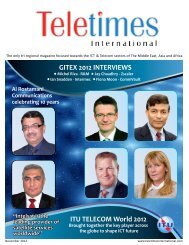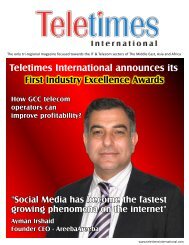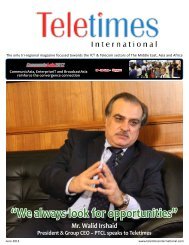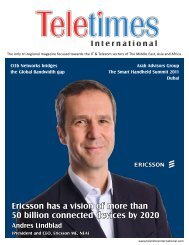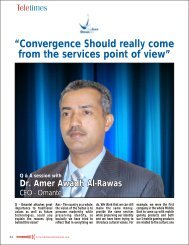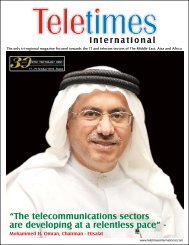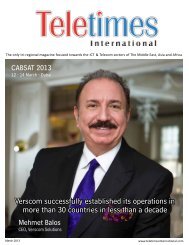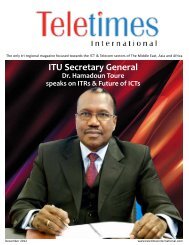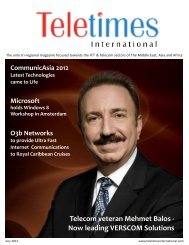Teletimes April 2011.pdf
Teletimes April 2011.pdf
Teletimes April 2011.pdf
You also want an ePaper? Increase the reach of your titles
YUMPU automatically turns print PDFs into web optimized ePapers that Google loves.
Dr. Karim Taga<br />
Capturing value in the mHealth oasis<br />
An opportunity for mobile network operators<br />
mHealth has been hailed<br />
as the next major<br />
development for mobile<br />
networks operators (MNOs),<br />
but could it be just wishful<br />
thinking from a sector<br />
desperately seeking additional<br />
revenues to offset margin<br />
erosion? While few commercial<br />
offers currently exist, mHealth<br />
is firmly on the agenda for<br />
many MNOs. In this viewpoint,<br />
Arthur D. Little assesses the<br />
key success factors that lay<br />
the foundations for operators<br />
to successfully navigate the<br />
mHealth minefield.<br />
With the right approach,<br />
mHealth can outperform even<br />
the highest of expectations.<br />
Advances in mobile technology<br />
have the potential to transform<br />
the way health care is<br />
delivered. mHealth, or mobile<br />
health, is the application of<br />
mobile technologies in health<br />
care systems that enables the<br />
transformation from physiciancentric<br />
to patient-centric<br />
health care delivery. mHealth<br />
enables critical decision<br />
support to be lever-aged at<br />
the point-of-care, ensuring the<br />
accuracy of clinical information<br />
and leading to higher quality<br />
patient outcomes while<br />
reducing medical errors, which<br />
are estimated to cost the U.S.<br />
$19.5 billion annually.<br />
For example, with an additional<br />
mHealth subscription through<br />
his mobile operator, a patient<br />
with hypertension could be<br />
provided with a blood pressure<br />
monitor that is wirelessly<br />
connected to his mobile phone<br />
and sends real-time updates<br />
to his doctor over the mobile<br />
network.<br />
Current health care delivery<br />
systems are becoming<br />
increasingly un-sustainable in<br />
both developed and emerging<br />
markets. In developed markets,<br />
an aging population and the<br />
evolving nature of medical<br />
conditions have shifted<br />
the focus to the long-term<br />
management of chronic<br />
conditions for a greater number<br />
of patients. As a result,<br />
spending on health care is<br />
increasing to unsustainable<br />
levels. In contrast, emerging<br />
markets are facing a significant<br />
shortage of trained medical<br />
staff, which has resulted in<br />
insufficient access to basic<br />
medical care. The rapid<br />
adoption of mobile technology<br />
can provide a fresh impetus<br />
for the health care industry to<br />
address such problems through<br />
the remote delivery of health<br />
care services, such as health<br />
education and awareness,<br />
remote data collection, remote<br />
monito-ring and epidemic<br />
tracking. mHealth also promises<br />
a significant boost in MNO<br />
revenues, resulting in a classic<br />
“Win-Win” situation.<br />
Given the prospects for<br />
mHealth, it is not surprising<br />
that analysts are estimating<br />
mHealth’s potential value to<br />
be up to 10 billion dollars<br />
within the next five years.<br />
However, while expanding into<br />
mHealth can create value and<br />
new growth opportunities for<br />
MNOs, there are significant<br />
challenges. Operators<br />
have been cautious about<br />
developing mHealth solutions<br />
due to the nascent state of<br />
the mHealth ecosystem and its<br />
unproven business models. In<br />
this viewpoint, Arthur D. Little<br />
assesses the key success factors<br />
for operators to successfully<br />
navigate the mHealth<br />
minefield. These include<br />
identifying the most suitable<br />
mHealth solutions, the most<br />
appropriate business model,<br />
and the key responsibilities for<br />
mobile operators.<br />
There is no one-size-fitsall<br />
mHealth solution for all<br />
markets<br />
The demand for, and the nature<br />
of, mHealth solutions depend<br />
on the degree of development<br />
and specific characteristics of<br />
individual markets. Emerging<br />
markets are characterized by a<br />
low degree of development of<br />
the health care infrastructure<br />
and regulatory environment,<br />
low ability to pay, and rapid<br />
growth in mobile penetration.<br />
Maximum value from mHealth<br />
in these markets intuitively<br />
comes from keeping offers<br />
simple. In such environments,<br />
mHealth can be an enabler for<br />
the provision of fundamental<br />
health care access to the<br />
masses.<br />
Conversely, developed markets<br />
are typically characterized<br />
by an established health<br />
care infrastructure, an aging<br />
population and high levels<br />
of smartphone penetration.<br />
However, developed markets<br />
are also likely to have a<br />
highly regulated health care<br />
environment that imposes<br />
controls on the provision<br />
of health care, the players<br />
who can participate and<br />
the accessibility of medical<br />
records. In this environment,<br />
mHealth should be treated<br />
as a complementary and<br />
sophisticated enhancement to<br />
traditional health care services,<br />
which leverages existing<br />
technologies.<br />
Utilize internal capabilities and<br />
leverage partnerships to create<br />
maximum value<br />
As existing ecosystems<br />
are still nascent, mHealth<br />
15Apr - 14May 2011<br />
www.teletimesinternational.com<br />
55



